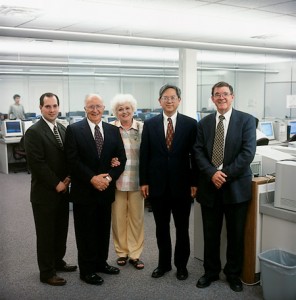
From left: TALL’s Joseph South; George W., ’61, and Diane C. Pace of the Kennedy Center; assistant to the president Gerrit Gong; and C. Ray Graham, ’67, of the ELC.
By Aimee H. Hansen, ‘02
THE complexity of legal English can be daunting for anyone. In fact, for most of us, legalese is a language all of its own. But imagine trying to master basic English, legal English, and the ins and outs of Western law, all at once.
This is exactly what many Chinese legal professionals are facing today. In 2001 China entered the World Trade Organization, where understanding Western law and legalese are necessities. As China begins the difficult process of integrating into the world economy, the United States is offering a helping hand. And because of its renowned abilities in language and education, BYU is in the middle of China’s integration process.
When Congress appropriated funds for China’s rule of law initiatives, Temple University, New York University, and BYU each received part of a grant. BYU was asked to develop a program for teaching English—specifically legal English—to China’s judges and legal professionals. Temple and NYU are responsible for the legal aspects of the program, while BYU has focused on language and teaching issues.
BYU‘s involvement has drawn upon the skills of three university programs: Technology Assisted Language Learning (TALL), the China Teachers Program from the David M. Kennedy Center, and the English Language Center (ELC).
Speaking of this conglomeration, Gerrit W. Gong, ’77, BYU-China liaison and assistant to President Merrill J. Bateman, remarked, “What we’re offering is a set of world-class capabilities. It’s a testament to BYU that we have these different components available to be brought together.”
Many of the selected Chinese professionals, while proficient in general English, have had minimal training in legal English. This is where BYU‘s TALL program comes into play. TALL develops educational language software that integrates computer-based learning activities with classroom experiences. As a complement to its core English-teaching program, TALL developed specialized content packages dealing with legal English for the China project.
“It’s exciting to be involved in a project that has the potential to benefit the Chinese people,” says Joseph B. South, ’95, an instructional designer for TALL. “Language can be a significant barrier in political, economic, and people-to-people relationships. This project could help overcome that basic language difference and become the foundation for building bridges in other areas.”
Critical to TALL‘s implementation in China is the China Teachers Program. Jeffrey F. Ringer, ’84, director of the Kennedy Center, explains, “We have more than 60 teachers in China right now, and when the TALL program started up on this China project, they decided to draw upon our resources.”
The ELC focuses on the acquisition of English as a second language. It developed curriculum and is also supplying teachers for the China project.
President Bateman, administrators, and faculty have made numerous trips to China to get this project going. Gong says, “BYU is addressing significant issues and blessing people on campus and around the world. It’s great to be contributing to something that could be quite important to China’s economic development and integration into world trade.”








